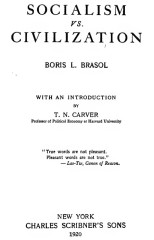
Author : Brasol Boris Leo
Title : Socialism vs. civilization
Year : 1920
Link download : Brasol_Boris_Leo_-_Socialism_vs_civilization.zip
Socialism and Socialistic agitation are not new things either in this country or in the world at large. Dreamers have been picturing ideal states of society at least as far back as Plato. Their pictures have impressed every generation and stirred a profotmd em.otional interest which, in many cases, became a religion. Idealistic Socialism, however, has made very little headway from the time of Plato tp the present year. Only a certain proportion of idealists are bom in any one generation. The great majority are blessed, if not with a saving sense of humor, at least with a sufficient regard for facts to prevent them from believing that a thing is true merely because it is pleasant to dream about. In 1822, when Robert Owen visited this country, he created a profotmd impression among the educated classes, and a larger proportion of these classes called themselves Socialists then than to-day. Again, in the forties of the last century, there was another outbreak of idealistic Socialism. Both in the twenties and in the forties there were numerous experiments in Communism. They were undertaken by people who had faith enough in their theories to believe that they would work without threats or violence, without an army to force them upon those who were unconvinced of their beneficence. A new type of Socialism, however, has arisen; and Marx is its spokesman. It has nothing in common with idealistic Socialism. It rests, not on persuasion, but on force. It does not profess to believe, as did the old idealists, that if Socialism be lifted up it will draw all men unto it. In fact, it has no ideals; it is materialistic and militant. Being materialistic and atheistic, it makes no use of such terms as right and justice, unless it be to quiet the consciences of those who stiU harbor such superstitions. It insists that these terms are mere conventionalities; the concepts mere bugaboos invented by the ruling caste to keep the masses under control. Except in a conventional sense, from this crude materialistic point of view there is neither right nor wrong, justice nor injustice, good nor bad. Until people who still believe in such silly notions divest their minds of them, they will never understand the first principles of Marxian Socialism. "Who creates our ideas of right and wrong? The ruling class. Why ? To insure their domination over the masses by depriving them of the power to think for themselves. We, the proletarians, when we get into power, will dominate the situation, we shall be the ruling caste, and, naturally, shall do what the ruling castes have always done, that is, we shall determine what is right and wrong. Do you ask us if what we propose is just? What do you mean by justice ? Do you ask if it is right ? What do you mean by right ? It wiU be good for us. That is all that right and justice ever did or ever can mean." The "proletarian revolution," the "dictatorship of the proletariat," when once understood, will be seen to be somewhat less idealistic than some of our sentimental intelligenzia have imagined them to be. One who understands them and the materialistic philosophy behind them, will understand the significance of the title of this book, Socialism versus Civilization. There is a close parallelism between the overthrow of an ancient civilization by invasion from without and the proposed overthrow of civilization by revolution from within. In neither case is there a conscious desire to destroy civilization. There is only a conscious determination to take possession of what is now in possession of others. If this results in the destruction of civilization, it is no part of the original purpose. It would be equally futile to argue in either case that it was wrong to do what was proposed. Under the materialistic interpretation of history, there is no wrong, there are only economic interests. Under the doctrine of class struggle, whatever one class can get belongs to it as certainly as whatever a tribe or nation can get belongs to it. Class war is quite as logical as tribal or national war. The spoils of war belong to the victor as logically in one case as in the other. Not a single one of the doctrines of Marx has ever been accepted by any economist or any philosopher. But, what of it ? It was not necessary that Gaiseric should convince economists or philosophers that there were sound reasons why he should capture Rome. He and his fdUowers wanted it, and they had the power to take it. History has proven Marx wrong on every prediction. Instead of the revolution coming first in the most highly capitalistic countries, it came in the least capitalistic coimtry, and the most ignorant. Instead of all reforms coming by class struggle, the most significant reforms have always come through the good-will of classes who had nothing to gain from them. No amotmt of economic argument or historical demonstration will still the clamor of those who have failed to adjust themselves to the system of liberty and voluntary agreement, and who covet the prosperity of those who could adapt themselves to that system. The only things that will save civiliz3,tion are, first, to make it possible for the great majority to prosper under this system, as they do in this coimtry, and, second, to show them that this system of liberty and voluntary agreement is the best possible system for men of intelligence, virtue, and productive capacity. All progress, as Sir Henry Maine pointed out, has consisted in a gradual change from status to contract. Gradually we have learned that large enterprises can be carried on by voliintary agreement among free citizens. This is one of the greatest discoveries of the human intellect, greater than the alphabet or the multiplication table. But it has its penalties and its dangers. Not every one is adjusted to this system. In the process of evolution, some are left behind. They naturally oppose the system, and would, if they could, start a backward movement. They might even call it progress. All Socialism is reactionary in this fundamental sense. Marxian Socialism ig the worst of all in that it proposes the use of force to turn the march of humanity backward. The author has performed a useful service by bringing this lesson home to the American people. He comes to his task with an tinusual equipment, having studied the literature of Marxism and the propagandist methods of Marxism in several different coimtries. He shows himself a master of the subject. Mr. Brasol is the author of a number of Russian books, including Critical Essays and Methods of Legal Examination. T. N. Carver. ...

Palmer Michael - Hiroshima revisited
Author : Palmer Michael Title : Hiroshima revisited The evidence that napalm and mustard gas helped...














